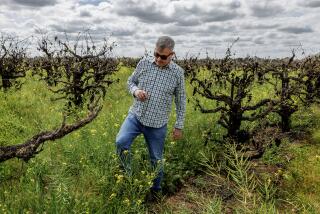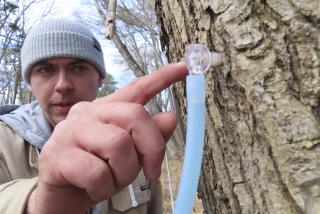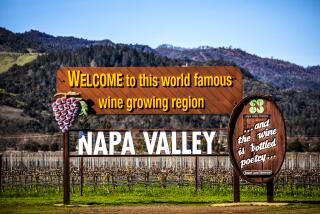Hard cider earns spaces at the tap
The very small town of Julian is about an hour northeast of San Diego. It’s a former mining outpost founded after the Civil War, and it soon filled with hardscrabble fortune-seekers during the California Gold Rush. It was the kind of place where you probably needed a drink after a long day of failing to strike it rich.
Lately though, the town has become known for a different gold-tinted export. Julian Hard Cider is one of a small wave of West Coast artisanal hard cider producers that are booming alongside craft beer. Cider has been long derided as a sugar-bomb meant for non-serious-drinkers, but cider makers and microbrew fans are touting hard cider’s centuries-old American roots, and plenty of L.A. bars and beer vendors are impressed with what’s being pressed.
“When the colonists came to America in the 1600s, they brought apple seeds in their pockets — and not because they were planning on eating a bunch of apples,” said Paul Thomas, the founder and president of Julian Hard Cider. “Thomas Jefferson, George Washington, they all had their own supply. America was founded on hard cider.”
Cider’s stereotype as the tipple of choice for sorority-party lightweights would be inaccurate in several different centuries. Before a wave of German immigrants in the 19th century, fresh-pressed hard apple cider and its bourbon-like liquor version applejack was the dominant booze of North America (it also helped that cider was often safer to drink than water in America’s cities). Johnny Appleseed was a real fellow whose plantings laid the drink’s foundations.
As lager-style beers gained favor in the 20th century though, cider lost its American ubiquity. Until recently, most American cider, seen in mass-produced brands such as Hornsby’s, was made from reconstituted apple juice concentrate, often shipped from China, with scads of added sugars.
But in the last few years, micro-pressers such as Julian, Sacramento’s Two Rivers and Oregon’s Wandering Aengus have been giving bars and specialty stores reasons to stock cider lists that the founders could get behind.
Au courant beer bars such as 1642 in Historic Filipinotown; downtown L.A.’s Spring Street Bar; West Hollywood’s Surly Goat and Burbank’s Story Tavern each carry high-end ciders on tap, some with multiple varietals. Even lowbrow bro-hangs such as Yard House at L.A. Live are stocking baselines like Blackthorn.
Julian and Wandering Aengus seem to lead the pack in L.A. distribution among the fresh-pressed small varietals. But specialty stores such as Sunset Beer Co. and the Historic Core’s Buzz have even more exotic selections — from the crisp Anglophile’s staple of Samuel Smith’s Organic to giant bottles of Spain’s Isategi Sagardo Naturala with pungent notes of sour lambic.
For drinkers whose palates have been elevated by craft beer, these ciders can be a lighter summery refresher or a flavorful autumn tipple with their own appeal.
“Our top two selling taps are ciders,” said Brian Slaught of Burbank’s Story Tavern, which keeps four on draft at all times. Right now they’ve got two kinds of Wandering Aengus, as well as Strongbow and Fox Barrel, on tap, with bottles of Julian and Crispin alongside them. They host a rotating series of Cider Nights, including one this Friday.
“When we got cider on tap, people were ecstatic about it and come specifically for it. When you grow up in the suburbs, you’re so distant from American history, and when people learn about cider they go back and see how the country developed.”
Another consideration: Slaught’s sister has celiac disease, making her intolerant of beer’s gluten, which cider doesn’t have.
Larger mass brewers are catching on: Samuel Adams has its Angry Orchard line; Miller Coors bought Crispin, a line famous for its ultra-light and flavored ciders. But committed drinkers have plenty of ways to scale up: Julian soon will be hawking an 18% ABV cider and a 94-proof applejack liquor.
Cider’s long history in America has come with its regulatory challenges. “The state laws on cider in America can date back to the 1600s, it’s just wild. You tell them you want to distribute applejack and they think you’re running a meth lab,” Thomas said. Julian’s precise 6.99% ABV and 22-ounce bottle size come from cider-specific regulations and taxes in California.
But he said Julian has doubled its output annually over the last four years, and as L.A.’s seemingly endless appetite for intriguing beers continues, hard cider looks to be a new staple in its drinking culture. Even for the tough guys out there.
“When I lived in England, cider was what the real drinkers were drinking,” Slaught said. “It was always the guys at the bar pounding Strongbows that you knew to watch out for.”
More to Read
The biggest entertainment stories
Get our big stories about Hollywood, film, television, music, arts, culture and more right in your inbox as soon as they publish.
You may occasionally receive promotional content from the Los Angeles Times.







